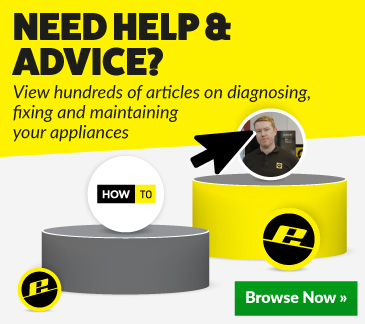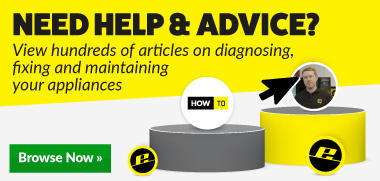Pressure washers are a popular appliance for cleaning a range of outdoor areas such as driveways, patios, decking, cars and outdoor furniture. So, whether you currently own a pressure washer or are thinking about purchasing one, it's important to make sure you're using it correctly and safely. Read on for a thorough guide on important safety checks for your pressure washer.
Important safety checks for your pressure washer
Let's dive right in! To learn how to use your pressure washer safely, watch the video or read our article below.
Read the Instruction Manual
First things first, you should always read the instruction manual that comes with your pressure washer. The instruction manual will not only include important safety information, but also all the instructions you need to set up and use your pressure washer safely. If you've lost or misplaced your pressure washer's instruction manual, don't worry. Simply head on over to our online manual finder and we'll do our best to find it for you.
Wear Appropriate Clothing
Pressure washers can be powerful tools, so it's also important to make sure you're wearing suitable clothes when using one. Long trousers, sturdy boots and safety goggles will help keep your feet, legs and eyes protected. It's also a good idea to wear gloves with a grip to help you keep a firm grip on your pressure washer and prevent it from slipping out of your hands.
Check Areas for Hazards Before Cleaning
Have a check over the area you're about to start pressure washing and make sure to remove any hazards from the area first. This includes toys, sticks, stones and other debris and items. Otherwise, the pressure washer could end up spraying items around causing damage, or clutter could lead to you tripping or harming yourself.
When Not to Use Your Pressure Washer
Knowing when not to use your pressure washer is just as important as knowing how to use it. As such, you shouldn't use your pressure washer outside if it's raining or particularly windy. This is because water or debris getting blown into the appliance can be a fire hazard and even cause electric shocks.
The Benefits of Using an RCD
For added protection when using outdoor appliances such as pressure washers, we recommend using an RCD (a residual current device). An RCD plugs into your wall plug socket or extension lead, and you can then plug your pressure washer into the RCD. The RCD measures the current flowing through it and cuts the power if it detects any issues, thus protecting you from electrocution.
Protect Electrical Products or Items
If you're spraying your pressure washer anywhere near electrical items or plug sockets, make sure they're all safely covered up before you start washing and do not spray directly at or into them. Also, make sure you keep the plug and power cord of your pressure washer dry. This will help you use the washer safely and avoid any electric shocks.
Use the Correct Detergent
It's important to make sure you use the correct detergent for your pressure washer and the task at hand. When choosing detergents, make sure they're suited to your particular model and properly diluted according to the packaging. Some detergents can also be irritating and harmful to skin, so if you get any detergent on yourself, make sure you wash it off as quickly and as thoroughly as possible.
Be Careful Pointing the Pressure Washer
Pressure washers can be very powerful, so make sure you never aim one at a pet, a person or yourself as this can cause serious harm. To avoid accidentally spraying someone or yourself, make sure your pressure washer is fully switched off and unplugged when you aren't using it. This includes engaging the safety latch on the handle, if your pressure washer has one.
Be Careful Working from Heights
When using a pressure washer from a height, such as for cleaning gutters, make sure you are in a stable and secure position. It can be easy to lean and stretch towards hard-to-reach areas when using a pressure washer on a ladder or standing on a piece of furniture, but you should always make sure your feet are planted firmly so you don't risk becoming off balance.
Don't Wash Windows
Though it isn't uncommon to see people washing car or home windows with pressure washers, this isn't actually something you should use a pressure washer for. Pressure washers eject water powerfully and this can dislodge or even crack your windows. This kind of damage is not only costly but also dangerous due to potential broken glass, so remember to avoid using your pressure washer to clean any windows.
Unplug When Changing Attachments
Pressure washers can use various attachments to make certain cleaning jobs and tasks easier. When changing these attachments, you should make sure the machine is fully switched off beforehand for your own safety. If you have an electric pressure washer, make sure you unplug it before changing attachments too.
Pay Attention to Warning Signs
With pressure washers, as with any appliance, warning signs of faults or damages should be taken seriously. If you can smell burning or hear any unusual noises coming from your pressure washer, turn it off immediately and don't turn it back on again until you have identified and fixed the problem. On the rare chance your pressure washer catches fire, don't try to put it out yourself. Instead, phone the fire brigade and let the professionals deal with it.
When Finishing Pressure Washing
Once you've finished using your pressure washer and have turned it off, make sure you remove any excess pressure in the wand by pulling the trigger. You should also regularly bleed your pressure washer, as air stuck inside the system can cause damage to the pump and reduce the washer's performance.
Safe Storage
When storing your pressure washer, make sure it is kept in a cool, dry place where it is protected from the elements. If you are storing your pressure washer for a long time, such as over winter, you should again refer to your user manual for instructions. These may include steps such as draining or flushing the water or even adding antifreeze. If water is left inside your washer and freezes, it will expand and damage the appliance. If you have a petrol pressure washer, storage steps may include draining the fuel or adding a fuel stabiliser. Some parts, such as the pump, may also need lubricating to prevent them from rusting.
There you have it! All the important safety checks for your pressure washer that you should know about. While you're here, we also recommend checking out our article on how to clean a pressure washer. Cleaning and properly caring for your pressure washer will help keep it running and working effectively for longer.
Before you go, don't forget to sign up to our mailing list below for more appliance maintenance information, repair guides, exclusive discounts and all other things eSpares.





 Print this article
Print this article